DFMCH honored faculty and staff with a virtual presentation in place of a traditional ceremony for the 2020 Renner Hansen and Farley Frey Awards. Honors included the Marc Hansen, MD, Lectureship; the John H. Renner, MD, “Wisconsin Idea” Award; the John Frey Writing Awards, and several others. The hour-long presentation was launched on January 20, 2021, and is available to view on the DFMCH YouTube channel.
Watch the 2020 Renner Hansen and Farley Frey Awards
In his opening remarks, Interim Chair William Schwab, MD, noted that everyone in the department was deserving of an award for their efforts and contributions during this unprecedented year. He continued by introducing John H. Renner “Wisconsin Idea” Lecturer Geoffrey Swain, MD, MPH, followed by Marc Hansen Lecturer Adrienne Hampton, MD. Both gave exceptional talks with one urging us to embrace change and the other teaching us about the importance of indulging blackness.
Renner Award Winner: Geoffrey Swain, MD, MPH
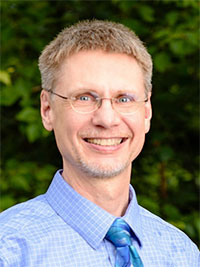
Geoffrey Swain, MD, MPH
Dr. Swain is an emeritus professor who served for over 15 years as an associate professor/professor at DFMCH where he was on the Community Health Advisory Board. He continues to serve on the UW School of Medicine and Public Health (SMPH) Master’s in Public Health Steering Committee, the TRIUMPH Advisory Committee and is the founding director and current board president of the Wisconsin Center for Health Equity. “Dr. Swain has focused on building and maintaining connections with community partners,” said Schwab. “In honoring him, we express our appreciation for his dedication and innovation as well as our respect for him as a role model who has demonstrated the power of bringing together family medicine and public health.”
In his presentation, “Relationships and Trust, Vulnerability and Challenges,” Dr. Swain stressed the importance of building relationships and understanding power as a fundamental cause of health inequities. “When I give someone credit for work I helped contribute to, it doesn’t detract from my power, it actually adds to it while also empowering the other person,” said Swain, while acknowledging that it’s easy for him “an old white guy with a bunch of letters after my name” to be relaxed about giving away his power. He noted it’s important to recognize that “many other people do not have the kinds of privileges that I do in this regard.” For this reason, added Swain, “we need direct and conscious attention to power in the spirit of reflective practice and continuous improvement.”
In closing, Dr. Swain challenged DFMCH to build even stronger relationships and research efforts in community health, and advocated for a stronger teaching emphasis on public health, more work around policy and advocacy, and a stronger commitment to the professional climate by empowering individuals and communities and supporting difficult growth and change. “The one person we can most likely change is the one you can see in the mirror, “said Swain. “Change is not easy and growth can be painful but the rewards make it worth the work.”
Hansen Lecturer: Adrienne Hampton, MD
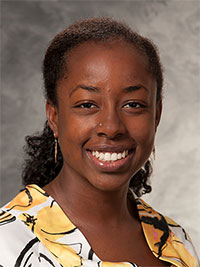
Adrienne Hampton, MD
Dr. Hampton joined the DFMCH as an assistant professor in 2015 after completing the Madison Family Medicine Residency Program and the DFMCH Academic Integrative Medicine Fellowship. She is nationally recognized for her teaching in a range of settings including the Family Centered Maternity Care Conference, the VA Whole Health Initiative, and the Heal Zen Leadership Program. In his introduction, Dr. Schwab described Dr. Hampton as a consummate family physician “highly respected for her expertise in women’s health, maternity care, and integrative medicine.”
In her presentation, “Song of 2020: High Notes, Low Notes, Blue Notes,” Dr. Hampton acknowledged that 2020 was rough with the loss of colleague Beth Potter, MD, and her husband Robin Carre; a tumultuous national election; the ongoing global pandemic; climate change; and the national debate over whether her life, as a Black person, matters. She added that she did find a silver lining at a UW Diversity Summit where she had the opportunity to hear keynote speaker Austin Channing Brown pose the question “What do you do to indulge your blackness?”
After pondering this question, Dr. Hampton invited the audience to indulge their blackness or celebrate someone else’s. She then picked up her guitar to celebrate her own blackness through the blues, an art form from the Deep South born in the 1800s and rooted in the experience of Black people. Dr. Hampton discovered her love for the blues through her father and later her partner, a professional musician. After demonstrating the 12 bar blues form, she encouraged others to think about their 2020 experience as she sang about hers in this participatory art form. “I appreciate you carving out this moment to appreciate and enjoy and indulge blackness and Black people’s music,” said Hampton in her closing remarks.
Robert Drachenberg Staff Excellence Awards: June Daws; Christina McOwen, RN; and Daniel Samuelson
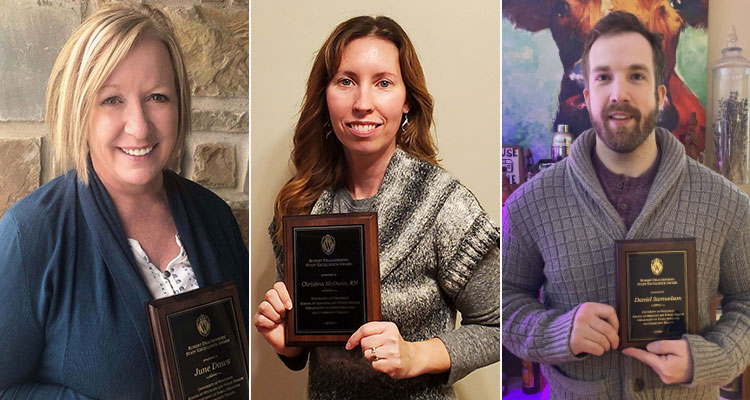
Left to right: June Daws; Christina McOwen, RN; Daniel Samuelson
June Daws, payroll and benefits specialist, was nominated by Dr. Valerie Gilchrist who praised her ability to project a cheerful attitude while working to resolve conflicts and handle difficult situations with remarkable patience.
Christina McOwen, RN, was nominated by Dr. Tom Hahn and manager Debra Gatzke for her initiative to check in with patients, take time to listen and establish a strong continuity relationship with them.
Daniel Samuelson, Madison Residency recruitment coordinator, was recognized by Dr. Ildi Martonffy; Student Services Coordinator Jennifer White; and Director of Educational Services Elizabeth Bingman. He was lauded for his innovation and ability to move events, conferences, and even resident interviews to the virtual world in 2020.
John Frey Writing Awards
The Frey Writing Awards were established in 2010 to honor John Frey, III, MD, past chair of the DFMCH, and to recognize and encourage individual creative writing.
Prose:

Left to right: Jonathan Rief, MD; Cassandra Sundaram; Maureen Goss; Markus Eckstein, MD; Shelbey Hagen; Samantha Gervais-LeClaire
- Life is Now (Jonathan Rief, MD)
- A Newsletter (Cassandra Sundaram)
- Ode to a Clump (Maureen Goss)
- POA (Markus Eckstein, MD)
- The Lady in the Sunhat (Shelbey Hagen)
- Your Diagnosis—An Open Letter to My Dad (Samantha Gervais-LeClaire)
Poetry:
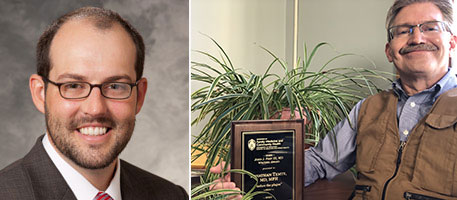
Left to Right: James Bigham, MD, MPH and Jon Temte, MD, PhD
- After the Virus (James Bigham, MD, MPH)
- before the plague (Jon Temte, MD, PhD)
Read all the the submissions: 2020 Writing Award Booklet (PDF)
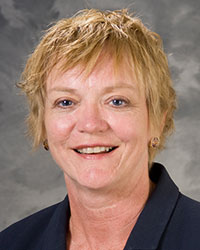
Sandra Kamnetz, MD
Richard Roberts, MD, JD, Clinical Excellence Award: Sandra Kamnetz, MD
Richard Roberts, MD, JD, presented the award to Sandra Kamnetz, MD, noting “it is fitting we honor such an extraordinary person in such an extraordinary year.”
Dr. Kamnetz has practiced full scope family medicine at the UW Health Yahara Clinic for 30 years. She also serves as the vice chair for Clinical Care advocating for DFMCH clinicians and serving as their ambassador to the UW System.
William Scheckler Awards for Research: Marlon Mundt, PhD, MA, MS, and Larissa Zakletskaia, PhD, MS; Ellen Goldstein, PhD. Honorable Mentions: Matt Swedlund, MD; Maggie Grabow, PhD
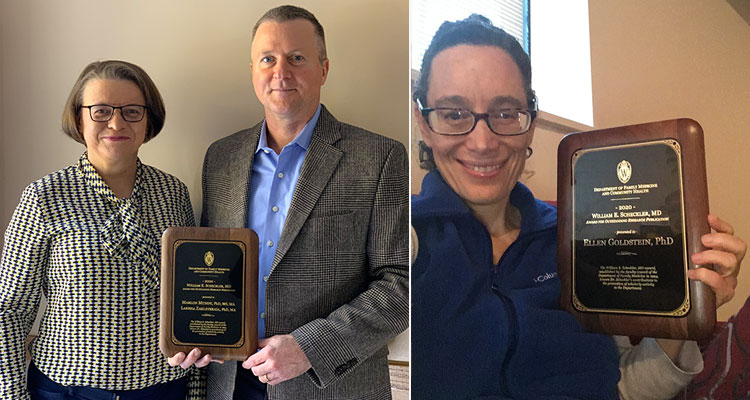
Left to right: Larissa Zakletskaia, PhD, MS; Marlon Mundt, PhD, MA, MS; Ellen Goldstein, PhD
Drs. Mundt and Zakletskaia’s paper, “Professional communication networks and job satisfaction in primary care clinics,” was published in the Annals of Family Medicine. It showed that interventions targeting professional communication networks might improve health care employee job satisfaction at primary care clinics.
Dr. Goldstein’s paper, “Addressing adverse childhood experiences and health risk behaviors among low-income, Black primary care patients: Testing feasibility of a motivation-based intervention,” was published in General Hospital Psychiatry. It showed that brief motivational treatment for adverse childhood experiences is feasible in underserved primary care patients and could help individuals develop healthier ways of coping with stress and improve health.
Congratulations to all of the honorees!
Published: January 2021
